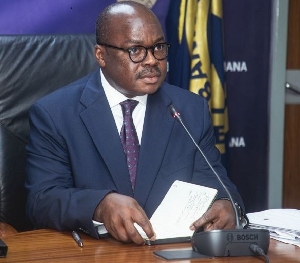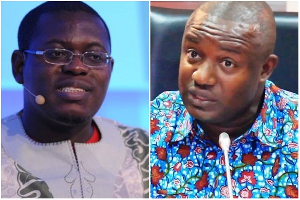Ghanaian economist, Julius Gyimah, has advised the Bank of Ghana (BoG) to take steps to turn the country's fortunes around and reduce further losses to avoid unfavorable economic repercussions.
He was responding to the central bank's loss of GH₵10.50 billion for the financial year ending in 2023.
He emphasized the need for the bank to be prudent, maintain fiscal discipline, and cut down on its expenditure as measures to ensure it records more profit than losses for the next financial year and beyond.
The Bank of Ghana recorded a loss of GH₵10.50 billion for the financial year ending in 2023.
Data released by the bank indicated that the loss was primarily due to a substantial increase in total interest expenses on open market operations by the Central Bank.
These expenses on open market operations rose by GH₵6.7 billion during the period under review.
In an interview with Rainbow Radio 87.5FM's Frontline, the economist suggested that the losses documented might not have been deliberate.
He explained to Kwabena Agyapong on Rainbow Radio 87.5FM that, as part of the bank's mandate, it takes on financial risks such as credit risk and interest rate risk, through loans to commercial banks or governments, or currency risk through the holding of foreign exchange reserves.
He stated that by doing this, the BoG might record losses, which are necessary to ensure the smooth functioning of the economy.
The financial system plays a crucial role in maintaining economic stability by stabilizing inflation and economic activity.
He observed that, compared to the previous financial year, the bank has seen a reduction from the GH₵60 billion it recorded in 2022.
He noted that from the data released, some gains can be seen, but he quickly added that the bank should adopt strategies that will help it reduce its losses.
Mr. Julius Gyimah warned that if these losses are repeated in subsequent years, they may create serious economic issues, including higher inflation rates.
"Already, with our arrangements with the International Monetary Fund and the dollar supply, the BoG is no longer injecting dollars into the economy, unlike before. In the past, when the Fiscal Operations Department of the Ministry of Finance was unable to generate dollars in the system, it quickly wrote to the BoG to inject money into the economy."
"So if the BoG is unable to turn the fortunes of this current situation around in subsequent years, it will create a serious crisis. We have yet to service our external debts, which we service in dollars. The bottom line is that if we do not help the bank make profits, they will have to depend on our reserves, which will create a dire situation."
He advised them to show empathy towards Ghanaians, avoid increasing staff allowances and expenses, and suspend unnecessary expenditures to reflect the current economic situation.
"Despite previous gains, the cost of living and inflation will both peak. The Board of Governors should cut its expenses. This is not the time to raise their allowances and salaries. They should be more empathetic to the public. If they can halt part of their expenditures, it will be a step in the right direction and reflect current circumstances. This is not the time for extravagance. We must continuously be disciplined, and when we do that, our situation will change."
He urged the Ministry of Finance to also implement policies to reduce expenditure, increase exports, reduce imports, and protect our economy by investing more in manufacturing and production to generate the growth that we desire.
Business News of Monday, 3 June 2024
Source: rainbowradioonline.com

















